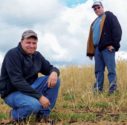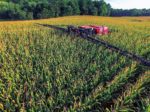Advertise Follow Us
Articles by Jim Ruen
Sometimes the messenger is just important as the message. For many farmers, peer-to-peer networking and education is the key to increasing the adoption of conservation practices.
Read More
On-Farm Research Validates Benefits of No-Till, Cover Crops
For Minnesota’s Sylling brothers, computer savvy, technical expertise and continuous testing make for impactful improvements in farm management practices.
Read More
No-Tillers Go ‘High and Wide’ to Make Cover Crops Work
Ohio no-tillers see opportunity to reduce post-harvest stress and boost soil health with timely seeding while cash crops are still standing.
Read More








